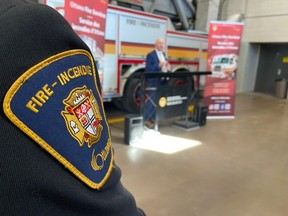Since 2015, Wounded Warriors has also partnered with police, fire and paramedic services to help them prepare for and recover from the effects of traumatic injuries.

Article content
Every time the alarm sounds, the sirens wail and Ottawa firefighters roll out to another call, fire Chief Paul Hutt worries.
“As chief, I’m always concerned about making sure that crews are getting back to the station safe after a fire,” he said. “We train all the time, and we’re the experts when it comes to putting out fires and dealing with emergencies.
Article content
“The pivot now is we have to make sure our members are coming home safe in terms of their mental health too.”
Advertisement 2
Article content
Last week, Ottawa Fire Services marked a new partnership with Wounded Warriors Canada, the 11-year-old organization that began offering mental health services to Canadian military members returning from the war in Afghanistan. Since 2015, Wounded Warriors has also partnered with police, fire and paramedic services to help them prepare for and recover from the effects of traumatic injuries.
The partnership was announced Thursday, the same day Wounded Warriors was called upon by Ottawa police after the horrific slaughter of six people in Barrhaven.

Such an intense incident as the Barrhaven killings is what is commonly thought of when people think about trauma, said Wounded Warriors CEO Scott Maxwell. But first responders like firefighters, police and paramedics are subject to stresses, big and small, day after day on the job. The effects are cumulative. Maxwell likens it to a feather falling on an already overloaded pack — the seemingly routine call that proves too much to handle.
“They feel so much shame,” he said. “They think, ‘I can’t believe I can’t handle that call. I must be weak. This must be me. I couldn’t take that little feather.’
Advertisement 3
Article content
“What we say is, ‘It’s not the feather. It’s what the feather landed on.’ ”
Last year, more than 77,000 first responders took Wounded Warriors’ Before Operation Stress course (BOSS) to help them learn to recognize and prepare for stress and traumatic incidents.
“If they use the skills and become more self-aware, they’ll be able put their hand up for help or take a knee much earlier than they would have before,” he said. “That’s what you want. You don’t want to bury it.”
Maxwell calls that the upstream component of Wounded Warriors’ programs. The downstream element is counselling and group therapy sessions that can help first responders and their families learn to cope with the “invisible injury” of an operational stress injury.
“Operational stress injury is an all-encompassing term,” Maxwell said. “It used to be that everyone was brushstroking everything as post-traumatic stress disorder. But not everyone with a traumatic injury has PTSD. They may have major depressive disorder. They may have general anxiety disorder. A lot of people felt they were being labelled. They’d be struggling and everyone says, ‘You have PTSD.’ But they say, ‘No, I don’t.’ ”
Advertisement 4
Article content
And though great advances have been made in talking about mental health, there is still more that needs to be done to break down the stigma, especially for the tough, seen-it-all psyche of first responders, he said.

“Sometimes you’re treating something they saw or experienced, but another aspect is how they were received by their own people when they sought help,” Maxwell said. “That sanctuary trauma — ‘I went to my own people and I was told that I was weak, or I was faking it or I couldn’t have been possibly been affected by that’ — that’s a huge part as well.”
David Andre, president of the Ottawa Professional Firefighters Association, said the Wounded Warriors partnership will be great for his nearly 1,000 members. Andre says he’s seen a positive change in mental health care over his 23-year career, with more care and attention to the issue coming from the city.
“In the past, people might go off sick and no one knew why. Now they’re willing to say it was because of this call or that call and that they’re getting the help they need. Before, they might just go off work and never come back.”
Advertisement 5
Article content
Andre carries with him the memory of 2006 pileup on Highway 417 near Embrun that killed five people. Andre was part of the team that extricated all of the victims.
“That’s a call I haven’t forgotten and probably never will forget,” he said.
“Sometimes we come home from these calls and we’re not the same. Some might reach out to alcohol. Some might reach out to other things. But they distance themselves from their families,” he said, citing the high divorce rates among first responders.
Though Hutt, himself a 32-year veteran of firefighting, says mental health services are much improved, the Wounded Warrior partnership will make it that much better.
“We would be complacent if we were to say we’re finished,” Hutt said. “There’s always more work to be done. We need to make sure we’re at the forefront of prevention to make sure people come home safe.”
Recommended from Editorial
Article content





